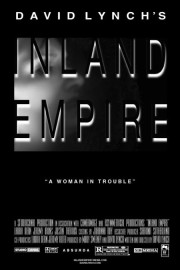INLAND EMPIRE
Even for hard-core David Lynch fans, “INLAND EMPIRE”- entirely financed, filmed, and distributed independently by the iconoclastic writer-director- might be difficult to take. True, I haven’t seen anything but the features- and have only seen his surreal debut “Eraserhead” once- but as an admirer of “Blue Velvet,” “Twin Peaks” (both the TV show and cinematic prequel “Fire Walk With Me”), and his 2001 masterpiece “Mulholland Dr.,” I couldn’t help but get excited about his latest effort, starring Laura Dern (who starred in “Velvet” and “Wild at Heart”), Jeremy Irons, and Justin Theroux (the director in “Mulholland Dr.”). But now having seen it twice (the first time was…incomplete shall we say), I alternately love it and hate it (and understand it) more the second time. Even fair weather Lynch fans owe it to themselves to see this film, although anyone with little or no previous with experience is advised to stay away.
To even attempt to describe many of Lynch’s storylines for any of his films is both a) a futile enterprise to bring logic to Lynch’s work and b) a risky proposition in terms of giving away spoilers. But the fun in Lynch’s work- at least it can be fun when he doesn’t fly off the rails (we’ll get to that)- is going in with only cursory information and seeing how it plays out onscreen. If it works (as it does in “Mulholland Dr.,” “Blue Velvet,” and “Eraserhead”), the characters suck you into a storyline that brims over with both cynicism and (though his detractors would say otherwise) humanism. If it doesn’t work (and though I appreciate it more, it doesn’t in “Lost Highway”), you sort of drift off into the ether as Lynch carries out whims of storytelling and surrealism that might be interesting if you cared about them. How “INLAND EMPIRE”- which clocks in at roughly three hours and was shot on a consumer digital camcorder- somehow falls into both camps in part of its’ allure…and frustration.
As Nikki, a Hollywood actress tapped for the starmaking role of Sue in the blandly-titled “On High in Blue Tomorrow,” which is actually remake of an incompleted Polish film (based on a gypsy curse; incomplete because both of the leads were murdered), Dern gives an astonishing performance that ranges from chipper glee to fragile paranoia to hard-nosed toughness as Lynch blurs the line between reality and illusion, with scene shifts that move from a sitcom featuring giant rabbits (the “Donnie Darko” kind, not the “Velvetine Rabbit” kind) to a girl in an apartment crying while watching TV to scenes of- what I would gather to be- Polish gangsters to scenes from “Blue Tomorrow” being acted out by Nikki and Devon (Theroux’s character) to scenes of a beaten Dern telling details of her past to a man in a dank room. A veteran of Lynchland (now more of one than most any other actor besides Kyle MacLachlan and the late Jack Nance), Dern- always a fascinating character actor (her performance in Alexander Payne’s “Citizen Ruth” is still a cause to celebrate)- isn’t afraid to follow the auteur into his most absurd and idiosyncratic ideas of cinematic storytelling, which is exactly the type of attitude you have to have in a Lynch film; the result is the performance of her career, a high-wire act of performance in a film that’s, fundamentally speaking, performance art…
…which gets to be problematic when you get into the third hour. At this point, you are either sucked into Lynch’s vortex of cinematic illusion or bored out of your mind; I was sucked (and forget whatever reservations you might have about the consumer quality DV- the style is part of the film’s allure, and Lynch chooses music- no score by Angelo Badalamenti this time, though some of it sounds like the composer’s work- that brilliantly heightens the mood and increases tension). The problem is, then the film really started to suck. Like, in that unique, “Worst…movie…ever!” type of way that I originally felt about “Lost Highway.” The difference is, further viewings can’t help the matter, because there’s an ending place much sooner in the third hour- like, with about 20-30 minutes left in the film- that would not only be a masterful bit of Lynch deviousness, but also a masterstroke of storytelling that hit home some of the themes of “EMPIRE” with unnerving clarity (I won’t reveal the moment here; if you’d like to hear my thoughts, and have seen the movie, email me and I’ll let you know where I would’ve ended the film). For the first time, I truly get the way people must have felt watching Steven Spielberg’s “A.I.,” and wanted Spielberg to end the film underwater; if you’ve seen the film (and followed the critical and fanboy responses to the film), you know what I’m talking about. I never had an issue with that film’s ending, but now I understand the frustration people who had issues with it had. Minus the unnecessary indulgences of the film’s last half an hour (which spill over into the credits), “INLAND EMPIRE” would be a masterpiece to rival Lynch’s best work- maybe even surpass it. But with the director’s final artistic whims tacked on in an attempt to push things further towards oddity and surrealism, we’re left with a brilliant meditation on the psychological toll of filmmaking that pushes needlessly too far towards something else.










